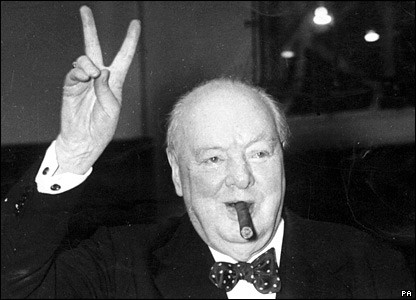mardi, 08 février 2011
Churchill: More Myth than Legend

Churchill: More Myth than Legend
by Patrick Foy
Last week a country-club Republican friend in Palm Beach gave me a copy of The Weekly Standard and urged me to read “A World in Crisis: What the thirties tell us about today” by opinion editor Matthew Continetti. The article would have the reader believe that the universe’s fate hinged upon a little-known 1931 Manhattan traffic accident involving Winston Churchill.
Churchill was crossing Fifth Avenue at 76th Street in the late evening of December 13th, 1931 on his way to Bernard Baruch’s apartment for a powwow when he looked the wrong way, crossed against the light, and was sideswiped by a car going 30MPH. The hapless statesman spent over a week in Lenox Hill Hospital recovering from a sprained shoulder, facial lacerations, and a mild concussion, all of which required a doctor’s prescription for “alcoholic spirits especially at meal times.” Continetti mentions “the granularity of history,” whatever that means: “If the car had been traveling just a little bit faster, the history of the twentieth century would have been irrevocably altered.” True enough, but for the better or the worse?
Continetti would argue that this chance mishap worked out for the best. His premise is that the 1930s were dangerous times much like our own, and it took the astute Winston Churchill to come to humanity’s rescue and make things right: “A few people in December 1931 recognized the growing danger. The patient at Lenox Hill Hospital was one.” Oh, dear. What bilge.
The Weekly Standard, as well as National Review Online and Commentary Magazine, all belong to the same faux-conservative neocon fraternity which hijacked Washington starting with H. W. Bush in the Cold War’s aftermath and has demolished any hope of a “peace dividend” ever since.
Fighting fire with gasoline is not generally a good idea, and Islamic extremism is a logical byproduct of the Tel Aviv-Washington alliance. Hence, the slow-motion downfall of the world’s “indispensable nation” is now upon us. It reminds me of the sad state of Little England in WWII’s aftermath, all thanks to Sir Winston’s myopic leadership.
Neocon opportunists have grabbed Churchill as one of their own. He is always linked to the presumed “good war” and has been glorified to the skies as a result. But what if that car had been traveling faster down Fifth Avenue in 1931 and knocked the British bulldog into the next world? Could the Second World War have been avoided altogether?
The “good war” resulted in approximately fifty million fatalities worldwide, left Europe a starved and blasted continent, destroyed the far-flung British and French empires, brought the Soviets into Europe’s heart for more than forty years, and handed China over to Mao Tse-tung.
Churchill actively participated in making World War II a global conflict. He promoted war’s outbreak in Europe in the summer of 1939, utilizing the Versailles Treaty’s last unresolved issue: Danzig and the Polish Corridor. Prime Minister Chamberlain gave Poland a blanket guarantee of the status quo, terminating a negotiated settlement and making war between Berlin and Warsaw inevitable.
In 1941, Churchill withheld vital information from the Hawaiian commanders about an imminent outbreak of hostilities. London’s Far East code-breakers had cracked the Japanese naval code, JN-25, and Churchill had access to it. The “surprise” attack on Pearl Harbor turned the European conflict into a truly global war. It was Pearl Harbor that saved Churchill’s backside and rescued the Roosevelt presidency.
Churchill had some surprisingly positive things to say about Hitler prior to the invasion of Poland. In Francis Neilson’s The Churchill Legend Neilson quotes what Churchill wrote about the German leader in a letter to himself dated September 17th, 1937 and included in Step by Step, published in 1939:
“One may dislike Hitler’s system and yet admire his patriotic achievement. If our country were defeated, I hope we would find a champion as indomitable to restore our courage and lead us back to our place among the nations.”
Along the same lines, Neilson cites the 1937 book Great Contemporaries, in which Churchill states that Hitler’s life’s story “cannot be read without admiration for the courage, the perseverance, and the vital force which enabled him to challenge, defy, conciliate, or overcome, all the authorities or resistances which barred his path.”
I’m now wondering about pre-1931. If the twentieth century could have been “irrevocably altered” by Churchill’s brush with death in a traffic accident between the World Wars, what if Churchill had never been engaged in politics in the first place? For the answer, one has only to get a copy of The Churchill Legend and read it. Francis Neilson, who was a member of Parliament at the outbreak of the Great War, claimed to have known Churchill longer than anyone alive.
The list of disasters Churchill presided over prior to the Second World War includes the fiasco at Gallipoli, the Lusitania’s sinking (when Churchill was First Lord of the Admiralty), and the issuance of the Balfour Declaration in 1917 by the British War Cabinet, which opened a Pandora’s box from which has sprung endless injustice and bloodshed in the Middle East. Not that Churchill deserves the sole credit for these disasters, but his fingerprints are there. He was certainly involved at the highest level. Both the sinking of the Lusitania and the Balfour Declaration were the byproducts of a desperate strategy to drag America into the Great War.
One gets the impression from reading Neilson that Churchill’s entire public career—grounded in both World Wars—shows indisputable evidence of incompetence, opportunism, ruthlessness, mendacity, and bad judgment. Yes, history is repeating itself.
00:05 Publié dans Histoire | Lien permanent | Commentaires (0) | Tags : histoire, churchill, angleterre, grande-bretagne, seconde guerre mondiale, première guerre mondiale, deuxième guerre mondiale, années 20, années 30, années 40, empire britannique |  |
|  del.icio.us |
del.icio.us |  |
|  Digg |
Digg | ![]() Facebook
Facebook



Les commentaires sont fermés.